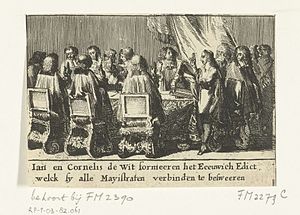Eeuwig edict

The Eeuwig edict from 1667 is a resolution of the states of Holland , in which they - at the instigation of Johan de Witt , his uncle Andries de Graeff and their powerful allies - resolved to abolish the hereditary governorship in Holland . The other six provinces of the Republic of the United Netherlands then declared the governorship and the office of Captain General of the Netherlands to be incompatible.
The drafting of the decree was incumbent on the aspiring Dutch statesmen Gaspar Fagel and Gillis Valckenier , who paradoxically later became powerful supporters of William III , who was appointed governor in 1672 . of Orange-Nassau were. The leading party of the Dutch city rulers wanted to achieve that the first governorless period would last forever and that the Orange governors and their political system would have become obsolete forever. With this decree, the Dutch leadership succeeded in securing their oligarchic power.
In 1672, the Rampjaar , in which the Orange came to power again through the murder of the brothers Johan and Cornelis de Witt , the Eeuwig edict was withdrawn by the Dutch States General under violent pressure.
Individual evidence
- ↑ Het Eeuwig edict (nl) ( Memento of the original from February 14, 2009 in the Internet Archive ) Info: The archive link was automatically inserted and not yet checked. Please check the original and archive link according to the instructions and then remove this notice.